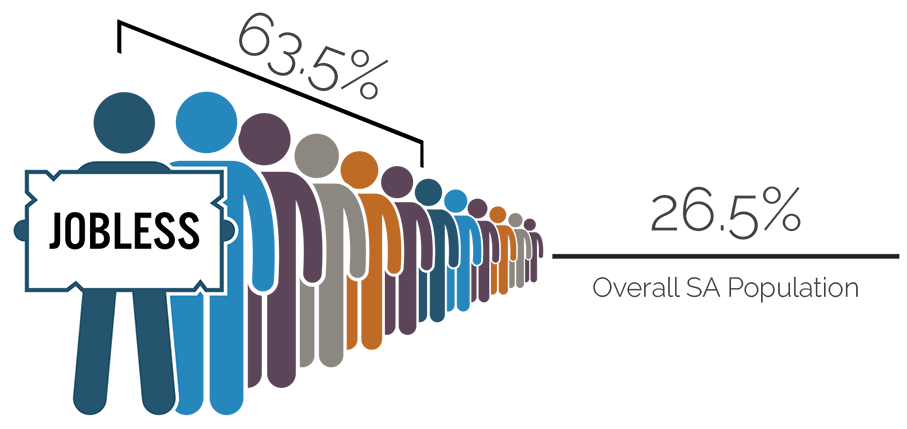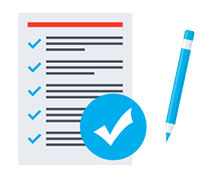
Youth unemployment is a challenge faced globally, leaving developing, low-income countries the most vulnerable. Recent estimates put South Africa’s unemployment rate at 26.5% for the overall population, with youth aged between 15 and 34 years accounting for 63.5% of those unemployed.
Limited work experience, lack of income and prolonged unemployment are regarded as key challenges which leave these young people vulnerable to perpetual poverty and inhibits the country’s ability to grow the economy and improve global competitiveness.

In response to the youth unemployment crisis, the South African private and public sectors are joining forces to develop a bold, new holistic approach to narrow the skills gap and enhance job-readiness among the youth.
The Youth Employment Service (YES) is a business-led partnership involving young people, the private sector, government, labour and the rest of civil society that hopes to address youth unemployment. It intends to improve prospects of finding employment by imparting quality experience and technical skills required for formal employment in SA’s modern economy. Through a holistic philosophy, the project aims to stimulate job creation through company investment and leveraging government’s existing recognitions such as the Employment Tax Incentive (ETI) and B-BBEE recognition for broad-based transformation
According to YES,
6 million young people out of work is a crisis for South Africa [that means] our future workforce is not being educated, trained or employed.
Read about: How Employment Tax Incentive Works
Securing South Africa’s economic prosperity
The organisation’s model is based on their research which concluded that job seekers with one-year experience and a curriculum vitae (CV) with more references are three times more likely to find work than those who don’t. The programme will link youth with businesses that will offer them a year’s paid work experience at no less than R3500 per month (an average of R55 000/annum) or seed funding and training for them to pursue their own entrepreneurial ventures.
YES is based on an ecosystem view and holistic approach that will include changing laws and championing existing business recognitions. In addition, capitalising on research and methodology within behavioural science, psychology and neuroscience will conceivably help bridge the debilitating gap between learning and earning.
The YES initiative aims to see more than 1 million young South Africans being offered paid work experience over the next three years, as part of placing the needs of and opportunities for young people at the centre of inclusive economic growth.
Success through ongoing commitment and engagement
The success of the initiative is dependent on the consistent interaction and support of various agents, institutions and local networks. While business contributes funding, skills and organisation; government acts as a regulatory power in the implementation of YES.
YES key stakeholders
Who are they?
Black (African, Coloured and Indian), 18 – 35
years old and unemployed for more than 6 months

What is their role in YES?
Securing SA’s future by building their
communities and economy with their
energy and commitment in places of
work.
How do they stand to benefit from YES?
They are at the centre of the transformation: gaining paid experience,
support for their entrepreneurial pursuits and receiving training that will advance them within the global economy. Access to new
opportunities has the potential to restore their dignity. They won’t be
excluded based on academic aptitude and their skillsets.
Who are they?
Large companies and small, medium
and micro-sized enterprises (SMMEs)

What is their role in YES?
The collective support of big and small
businesses will provide skills, funding
and organisation.
How do they stand to benefit from YES?
Companies stand to improve their B-BBEE scorecard and SMMEs
could qualify for the ETI. Participating in the national programme
links them to fresh talent, improves their visibility, encourages
competition, helps establish their track records and promotes
access to broader markets.

What is their role in YES?
As a regulatory body, the state will
implement amendments to the law and
champion existing recognitions that will
affect businesses.
How do they stand to benefit from YES?
YES is projected to be one of the significant pillars in creating a more
inclusive and sustainable economy that could be a major force in
the fourth industrial revolution. The country is set to break out of
their high unemployment rate and low economic growth—restoring
the population’s confidence in government.

What is their role in YES?
The collective support of big and small
businesses will provide skills, funding
and organisation.
How do they stand to benefit from YES?
Companies stand to improve their B-BBEE scorecard and SMMEs
could qualify for the ETI. Participating in the national programme
links them to fresh talent, improves their visibility, encourages
competition, helps establish their track records and promotes
access to broader markets.

What is their role in YES?
Civil society’s support of YES-registered
companies will ignite local economies
and promote domestic markets.
How do they stand to benefit from YES?
YES is projected to create career opportunities for many South
Africans and impact a culture of learning and employment that will
help catalyse an inclusive and sustainable economy.
Addressing the factors contributing to unemployment and poverty
Key obstacles the organisation hopes to address include inadequate education and literacy skills; limited communication skills; lack of access to social networks providing employment opportunities; poor transport infrastructure and low self-confidence due to social divides and perpetuated poverty.
YES is developing a database of employers and job seekers and is utilising Artificial Intelligence (AI) algorithms to optimise the match between vacancies and candidates. It seeks to assist candidates with finding appropriate and relevant work opportunities by emphasising psychometric compatibility and commuting distance, thereby increasing the likelihood of rewarding employment.

Unemployment has left many suffering from depression, a loss of self-confidence and social capital. YES is applying fresh thinking to create new work opportunities; giving youth a chance to establish a brighter future, become self-directed and restore their dignity.
It’s time for business to step up
At the time of the launch in March 2018, 100 companies had already committed to employing young people through YES starting from 2018; ensuring that they are not excluded because of their academic abilities and skillsets.
Unilever, Sasol, Investec, ABSA, Netcare, Discovery, Nedbank, MTN, Woolworths and Spar are some of the more recognisable brands that will help bridge the gap between learning and earning—allowing participants to compete in the global economy that’s currently in its fourth industrial revolution driven by rapid advances in digital and other technological spaces. YES believes that youth need to be trained in a range of emerging new disciplines including computer sciences, biotechnology, nanotechnology, coding, robotics and AI.
Registration and placement fees for companies will ensure sustainable funding for the service. These are calculated according to the turnover of each business. Placement fees apply to organisations that qualify for B-BBEE recognition.
SMME Development Strategy
In development stories all over the world, SMMEs lead as major job creators and are often in a better position to do so than larger corporates, owing to a less complex process of skills transfer, with lower power and cultural differences.
YES’s CEO Tashmia Ismail-Saville urges SMMEs to get involved in the collective, national effort. Two thirds of South Africa’s workforce are already employed by small-medium businesses. SMMEs have the capacity to develop existing economic activities as well as local economies and address the traditional low value, low sustainability cycle of small business.
The new Youth Employment B-BBEE recognition will allow a business that meets YES targets and complies with registration criteria to move up a level on their current B-BBEE scorecard. In addition, to encourage demand-side job creation and companies employing Black youth aged 18 – 29 years old will qualify for the ETI.
Read about how: Tax Incentive encourages career development
Training and technology through YES Community Hubs
Strategically placed in townships and rural areas across the country, community hubs are set to be inclusive, engaging environments with modern technology and skilled staff. This environment will be designed to support existing and aspiring business owners through training, mentoring and technology.
Strategically placed in townships and rural areas across the country, community hubs are set to be inclusive, engaging environments with modern technology and skilled staff. This environment will be designed to support existing and aspiring business owners through training, mentoring and technology.

The SMME Development Strategy has three focus areas that will be housed in YES Community Hubs:
1. Business development:

- Support with formalisation and document compliance that will give SMMEs access to formal markets
- Development of business models that speak to their customer segments and deliver on value proposition in a sustainable way
- Light manufacturing and operational support with 3D printing technology, design services and internet connectivity
2. Route to market:

- Overcoming geospatial limitations and the perception of poor service and quality associated with SMMEs
- Connecting SMMEs to large companies and the public
- Encouraging visibility and quality, establishing track records and encouraging competition
3. Critical skills training:

- Providing training that is business-appropriate (such as financial wellness, consumer education and a culture
of saving) and industry-specific (relating to markets that could operate in townships or rural areas)
There are three channels through which companies can participate:
1.
Corporate work experiences: Creating one-year paid positions for youth, adding to their current employment numbers as well as meeting YES targets with NPAT investment and meeting B-BBEE criteria that results in Youth Employment B-BBEE recognition eligibility;
2.
Corporate SMMEs hosting placements: If they don’t have the capacity to hire more employees, businesses could sponsor the salary for one-year placements in small and medium enterprises thus building the capacity of SMMEs;
3.
SMME development: This empowers young people to launch and grow their own businesses with YES supporting them through entrepreneurial training (including business literacy), seed funding (for infrastructure and salaries) and value-chain integration (through the creation of inclusive business opportunities).
According to ETI research, adding a subsidised workforce to SMMEs results in an increase in productivity, competitiveness and profitability.
Will your business be part of creating a future that works?
As a member of the Youth Employment Service, your company will contribute to an ecosystem that will help create a more inclusive and stable economy that is centred on an educated, employed and employable youth. Should this initiative succeed, it may pave the way to addressing youth unemployment on a global scale.
Are you a small to medium business interested in bridging youth’s gap between learning and earning? FCS Precision Payroll appreciates that registering and adhering to the new national initiative’s requirements requires intricate administration and management of your staff intake.
Let us help you register to contribute to and benefit from the Youth Employment Service or the Employment Tax Incentive.
